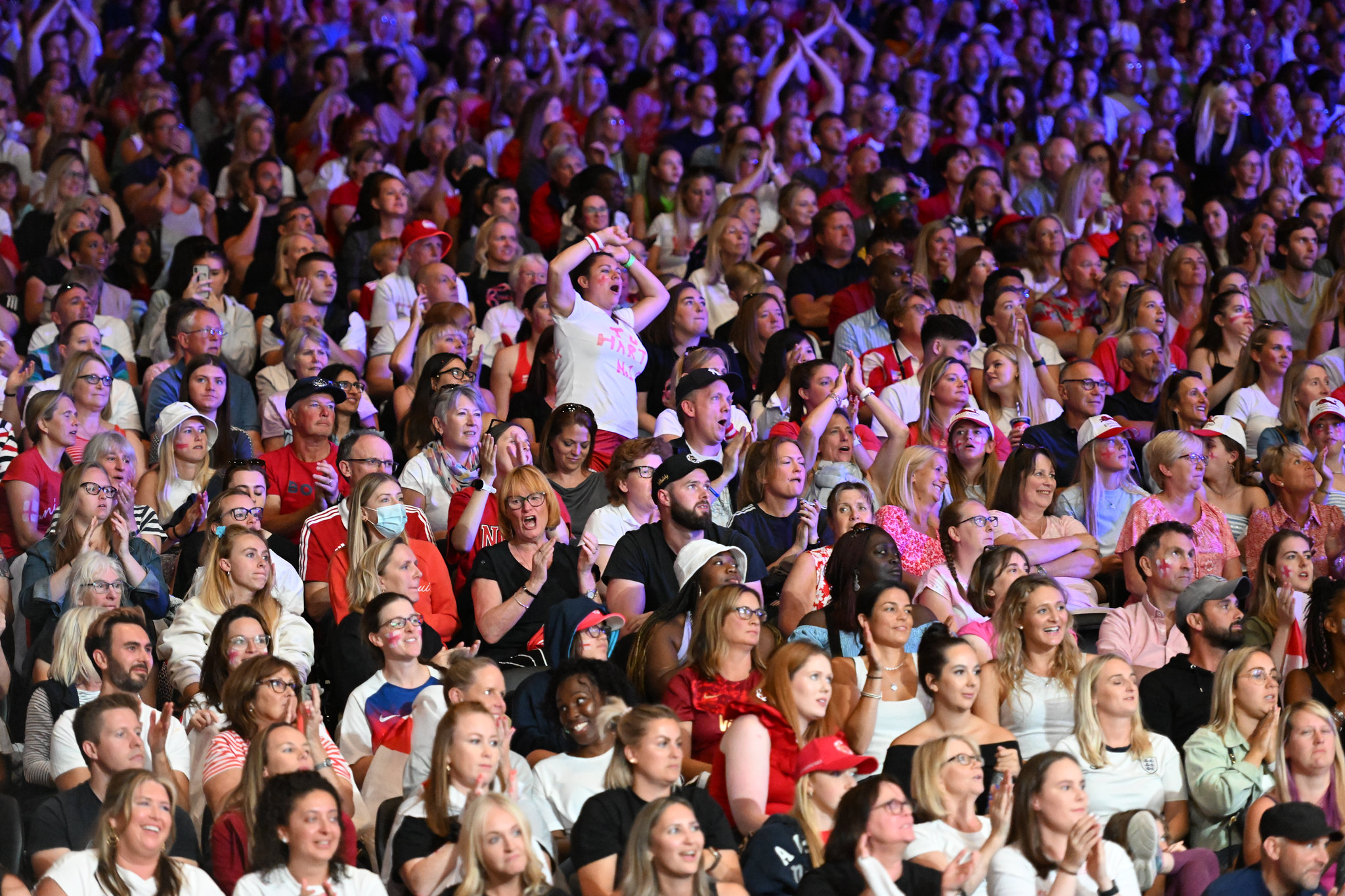
Saturday 6th August
**Keep your eyes on Netball Scoop’s socials, as we bring you a “Behind the Scenes” vlog of each day’s activities, along with ‘Short and Sharp’ on the Reels.**
Results
Semi-final 1 – Jamaica 67 def New Zealand 51
Semi-final 2 – Australia 60 def England 51
—
Milestones
Congratulations to Courtney Bruce on her 50th international test match
Courtney Bruce played her 50th match today. Image Sue McKay/Kick It To Me
—
Let’s talk
Jamaica have won through to their first ever gold medal game at a major international tournament. In a powerful display, they easily accounted for New Zealand, and it was their first success in 12 semi-final appearances at this level. New Zealand has now lost badly at the semi-final stage of the last two Commonwealth Games tournaments, having been beaten by 21 goals by Australia in 2018.
Jamaica’s first quarter against New Zealand was some of the most clinical netball the team has delivered – ever!! They ruthlessly accounted for the finest team that New Zealand had to offer, and didn’t look back from there. Shooting 100% accuracy for a whole match was a also first for the Commonwealth Games, while a turnover rate of just one by half time was mind-blowingly good.
Jhaniele Fowler is one of the most laidback players in the game, but an English journalist who asked her earlier in the week if she’d consider playing for Australia got a very terse response. Fowler is Jamaican through and through, and the sight of her pacing the transverse line during today’s semi, yelling support for her team, is the most animated we’ve ever seen her.
Jamaica’s opponents in the gold medal game will be Australia, who defeated England 60-51 in the other semi-final. It continues Australia’s record of reaching the decider of every major netball tournament since the introduction of finals in 1991. This was Australia’s 14th semi-final at either Commonwealth Games or World Cup level and they are yet to lose one.
The England v Australia match was one of the most frustrating to watch in a long time. The amount of whistle (138 penalties in total) by the two New Zealand adjudicators not only shut the defenders out of the game, but the stop-start nature was difficult viewing. It was also vastly different from what was allowed in the Jamaica v New Zealand match, where both umpires were Australian. It will fascinating to see what will be allowed in the medal matches.
Birmingham’s NEC Arena seats 9500, and has been a sell out for all but one or two sessions. Tickets for the finals are like gold dust, with even families of athletes disappointingly unable to find seats. The Netball World Cup 2015 had crowds almost double that, while the Suncorp Super Netball final seated almost 14 000 people.
So for the Commonwealth Games 2026 to be held in regional Australia, in a stadium less than half Birmingham’s size, seems to downplay how many fans the sport attracts, and how much infrastructure is needed to support it.
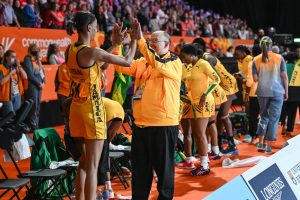
Assistant coach Rob Wright celebrates with Shamera Sterling. Image Sue McKay/Kick It To Me
—
Injuries
It’s the end of the tournament when bodies are tired, niggles appear, and fans question every selection decision. Without knowing what is going on behind the scenes, it’s hard to know whether a team is selected purely on form, or whether it’s a case of last person standing. So, please remember this when posting online, criticising selection choices.
Paige Hadley hasn’t recovered from a calf injury in time to take the court for Australia. The coaching staff paid credit to the amount of work she’s done coaching the midcourt.
The goal post suffered a fatal injury when Layla Guscoth straddled it at full tilt. Play was halted while it was replaced, but it still needed a good yank by English athlete Geva Mentor to bring it into some semblance of alignment. Following the match, it was once again removed, and was last observed needing some serious surgery with a welding arc.
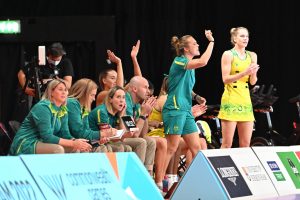
Paige Hadley supports Australia from the bench. Image Sue McKay/Kick It To Me
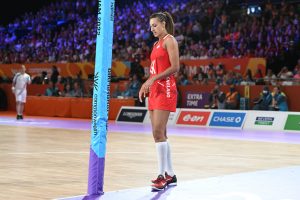
Geva Mentor eyes off the goal post before whipping it into shape. Image Sue McKay/Kick It To Me
—
Stat Chat
Jamaican team shooting – 67/67 (100%)
Jhaniele Fowler (Jamaica) – 54/54 (100%)
Gretel Bueta (Australia) – 43/44 (98%)
Shamera Sterling (Jamaica) – 6 gains
Jodi-Ann Ward (Jamaica) – 4 deflections
Liz Watson (Australia) – 27 assists from 46 feeds
Khadijah Williams (Jamaica) – 23 assists from 31 feeds
Courtney Bruce (Australia) – 25 penalties
Maia Wilson (New Zealand) – 4 turnovers
Liz Watson (Australia) – 4 turnovers
—
Players of the Day
Nicole Dixon-Rochester had an outstanding performance in both defence and attack for Jamaica. Previously an impact player in major tournaments, she has run rings around all opposition including the much-vaunted Silver Ferns midcourt. Her feeds were equal to her goal and wing attack, and she picked up more gains than everyone except goal keeper Shamera Sterling. More vital is the assured link she creates in transition, finding both more pace and security down the court.
It’s impossible to go past Gretel Bueta’s unique and uncanny goal shooter style. Beyond her 43/44 at 98% against England, she has been moulded in a totally different way to a classic post shooter. Her enormous jump and strong hands make her difficult to stop with the likes of Liz Watson setting her up. Even with the pressure of world class defence, she kept wearing contacts dozens of times, then sinking a shot with a smile.
Jhaniele Fowler stakes the other claim for best shooter in the tournament. It seems incredible but today the Jamaican bettered her own bests, nailing 54 goals at 100%, while taking on the mantle of captain, and, rather than being distracted, leading her teammates to a thorough drubbing of world netball powerhouse New Zealand.
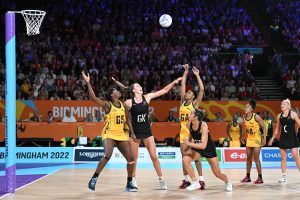
Jhaniele Fowler shot a perfect game in Jamaica’s semi-final. Image Sue McKay/Kick It To Me
—
Match reports
Jamaica 67 defeated New Zealand 51 (18-9, 18-13, 16-13, 15-16 )
History was made by Jamaica in the first semi-final at the Birmingham Commonwealth Games. The world number four placed one and a half hands on the gold medal with a crushing defeat of second-ranked New Zealand, two days after a last-gasp victory over Australia. From the start the result appeared inevitable, with the Sunshine Girls defensive wall unbreachable, their midcourt disciplined, and an unheard of 100% shooting for the entire match.
World champions New Zealand fell away immediately, behind 2-6 and then 4-10 in the first quarter. The access to their circle was poor, feeds were blinkered, and their shooters had too many nervous turnovers. Maia Wilson was smartly using her body to open space at the post, but fundamentally Shamera Sterling and Latanya Wilson were several clicks faster with their footwork and anticipation, making the feeders hesitate gradually more during the quarter.
The Silver Ferns used an intimidating tight zone over both transverse lines, but their opponents were patient and showed no nerves whatsoever, waiting until the zone shifted and crafting the ball to circle edge, from where feeds to captain Jhaniele Fowler were unstoppable. In contrast, the Sunshine Girls back four pushed the Kiwis to the sidelines, allowing those behind to run onto multiple intercepts, with eight gains in the first half. From then on, the Kiwis never got closer than the margin of 14 goals.
New Zealand coach Noeline Taurua used 11 of her bench in the match, with only Bailey Mes watching on for the whole 60 minutes. A solid move was bringing on 20-year old Grace Newke in the third quarter at goal shooter for her eleventh test cap. The rookie was effective, shooting 24/24, and keeping Sterling quiet to begin with.
The Silver Ferns feeders grew in confidence with Nweke’s accuracy and availability, and exploited any height mismatches against Latanya Wilson. Shannon Saunders, taking wing attack for the second half, didn’t have overly better stats than Gina Crampton on paper, but she provided extra hustle and earlier vision of the circle.
The real problem was what to do against the Fowler juggernaut, as Kelly Jury was out of play twelve times in 39 minutes. Double-teaming the towering shooter allowed veteran goal attack Shanice Beckford acres of space to cut to the post, despite having the nimble Phoenix Karaka marking her.
The play of Sunshine Girls centre Nicole Dixon-Rochester was truly sparkling, as she slotted in with perfect timing in attack to finish on par with the goal assists of Beckford and Khadijah Williams, whilst also earning more gains than both her wing defence Jodi-Ann Ward and goal defence Latanya Wilson.
The support from the crowd and the bench for Jamaica pumped more and more as the result looked done leading into the last quarter. Rare shows of passion from Fowler drove her team to stay consistent and power home. It took over 53 minutes for coach Connie Francis to make any changes to her lineup even though her team led by 18 goals, meaning some of her star players were on court for two full matches leading into the grand final.
Once the Jamaican bench was emptied, the Silver Ferns were able to make small inroads into the score, and they finished with a few nice plays and 93% shooting. However, there had been an air of resignation about the Kiwi athletes since half time, knowing a comeback had been impossible.
The Sunshine Girls celebrated their biggest ever win over the Silver Ferns, and their first ever grand final in a major tournament, with a dance led by Sterling and Adean Thomas to thank the crowd. They would move on to take their best ever result of either silver, or hopefully gold, beckoning in a little over 24 hours.
JAMAICA
FOWLER 54/54 (100%)
BECKFORD 10/10 (100%)
NELSON 3/3 (100%)
TOTAL 67/67 (100%)
NEW ZEALAND
NWEKE 24/24 (100%)
SELBY-RICKIT 14/16 (88%)
WILSON 13/15 (87%)
TOTAL 51/55 (93%)
ASSISTS: JAM 67-49 (WILLIAMS 23, BECKFORD 21, DIXON-ROCHESTER 20)
GAINS: JAM 14-7 (STERLING 6, DIXON-ROCHESTER 3)
PENALTIES: NZ 51-39 (JURY 12, KARAKA 10)
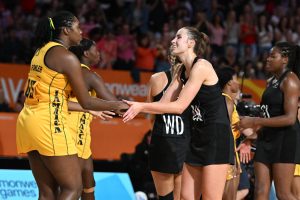
Jhaniele Fowler and Kelly Jury shake hands after the game. Image Sue McKay/Kick It To Me
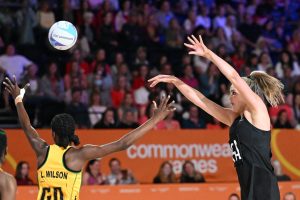
Te Paea Selby-Rickit sneaks a ball past Latanya Wilson. Image Sue McKay/Kick It To Me
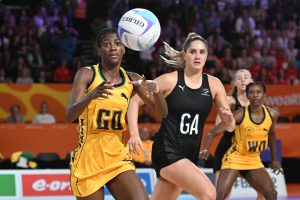
Latanya Wilson turns the tables. Image Sue McKay/Kick It To Me
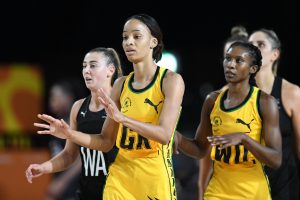
Shamera Sterling and Jodi-Ann Ward have both starred for Jamaica. Image Sue McKay/Kick It To Me
—
Australia 60 defeated England 51 (15-12, 14-11, 16-13, 15-15)
The Australian Diamonds won through to their seventh Commonwealth Games gold-medal encounter with excellent application of a game plan that left hosts England’s Roses lost for answers. The elevation, timing, and accuracy of Gretel Bueta had shone throughout the week, and again she outclassed some of the best defenders in the world, ably fed by captain Liz Watson.
While Australia kept the same seven throughout, England used 11 of their players, trying in vain to stifle the electric connections of the Diamonds attack. The addition of Eleanor Cardwell at goal shooter gave the Roses a quick scoring option, but it was too little too late, and they were relegated to a bronze medal playoff, while Australia will face Jamaica tomorrow for the ultimate prize.
Australia scored first off a turnover and never relinquished the lead. They used their midcourt to defend the top of the English circle, with Ash Brazill smothering Jade Clarke and Nat Metcalf. In contrast, the Roses double-teamed a driving player, tempting a cross-court ball. The Diamonds didn’t fall for the trap, and instead turned the tables on the English, doubling back and keeping their defenders very cluttered while driving down the middle.
In an unforgettable rare highlight of the tournament, Layla Guscoth collided heavily with the goal post, legs straddling and full of laughter! With such momentum, she had in fact bent the post – within 2 minutes a new post was carried out and checked by umpires. After just four minutes of action, the bemused players effectively had to restart the game.
Geva Mentor was struggling to get back and up to the quick feeds to Bueta. The Diamonds’ tactic was no secret, but appeared impossible to defend. Gradually through the first quarter the England legend adjusted her angle and timing, yet was called for repeated contacts. Liz Watson and Steph Wood were able to easily thread passes to Bueta between two defenders. There also was no answer for the sweet long-range shots of Wood, who finished with 17 from 20 at 85%.
The English had a slower approach to post, with a veteran goal circle keeping them in touch. Helen Housby delivered her trademark incisive drives and cool shooting, while Jo Harten used smarts and strong body work to keep possession. The pair shot 12/12 in the first period.
With umpire Gareth Fowler calling each minor bump as a contact, it was up to Australian centre Kate Moloney to adjust lest she fall out of the defensive unit. In attack she was solid all game, always available for a reoffer or a swing ball, with only one turnover in total. As the first half progressed, the Diamonds feeders became more comfortable with riskier and longer balls, which Bueta pulled in every time despite fierce physical contest. Even when her arms were being held down, she leapt for an effective take and scored a contact penalty.
Part way through the second quarter England were down 14-23. There was great value in Brazill’s athleticism for the centre pass, and the transverse line backup of Jo Weston. It was left to England captain Metcalf to chalk up defensive gains, never switching off and providing valuable deflections. This caused a re-energised Roses defence, temporarily confusing their opponents and dragging the lead back in from 11 to 6 by half time, aided by 100% shooting from Harten and a tenacious Housby,
England coach Jess Thirlby opted to take Housby to the bench and inject Cardwell. Harten enjoyed more open space as Australian goal keeper Courtney Bruce retreated early and allowed some double and triple-plays. This did steady the ship with easier access to the Roses circle. At the other end, Watson’s timing and choice of drives was almost perfect, showing amazing strength on difficult takes, and uncanny quick vision to the shooters. The first half finished with essentially even penalties, gains, turnovers, and pickups from both sides, but a scoreline favouring the Diamonds by six.
In the third quarter England instantly looked better in attack, due to the holds and strength of Cardwell, and also a quick release to players driving to the pocket, reducing reliance on the top of the circle for feeds. Their issue continued to be a lack of answers to Bueta’s athleticism, and the Roses took more and more risks in attack. Meanwhile, Australia seemed able to rescue messy passages of play to scramble and score.
Late in the third quarter Harten took her first long-range attempt and missed. Her return of 16/17 in 40 minutes simply wasn’t enough to stablise her team. Housby returned at goal attack and Cardwell moved to shooter, resulting in the strongest England shooting combination to close the match. Cardwell’s fantastic split and strong holds created a surge from the host nation, as she ended with 22 goals at 92% for the match.
The passionate English crowd was deafening in the final fifteen. Bruce and Cardwell were almost belting each other – Bruce called for deliberately holding the shoulder of her opponent, and Cardwell witnessed deliberately taking a swing at the Australian goal keeper and dissenting with the umpire. England got their mojo and clambered to within six, as they targeted Watson and forced Bueta to come way out of the circle, before Australia steadied.
Guscoth started to become desperate, giving away penalties for holding Wood. With a bit of luck going the way of both teams, it took until the last three minutes for the Australian coaches and bench to relax and smile with an eight-goal advantage. The Diamonds weathered everything thrown at them by a valiant England team, relieved to make the grand final against Jamaica for the final gold medal of the Games.
ENGLAND
CARDWELL 22/24 (92%)
HARTEN 16/17 (94%)
HOUSBY 13/14 (93%)
TOTAL 51/55 (93%)
AUSTRALIA
BUETA 43/44 (98%)
WOOD 17/20 (85%)
TOTAL 60/64 (94%)
ASSISTS: AUS 50-49 (WATSON 27, WOOD 17, METCALF 15)
GAINS: AUS 9-7 (BRUCE 4, WESTON, ALLISON, HOUSBY 2)
PENALTIES: ENG 73-65 (BRUCE 25, MENTOR 21, GUSCOTH 19)
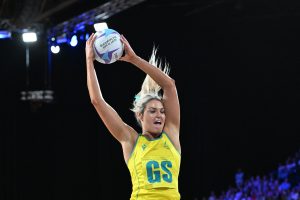
Gretel Bueta was formidable for Australia. Image Sue McKay/Kick It To Me
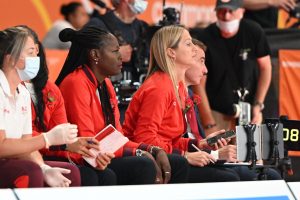
Jess Thirlby and Sonia Mkoloma look on. Image Sue McKay/Kick It To Me
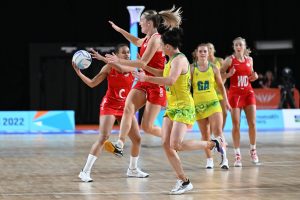
Ash Brazill did a terrific shut down job on Nat Metcalf. Image Sue McKay/Kick It To Me
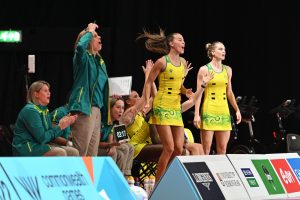
The Australian bench going through all the feels. Image Sue McKay/Kick It To Me
—
TOMORROW’S SCHEDULE
BRONZE MEDAL GAME:
1:30pm – NEW ZEALAND v ENGLAND
(10:30pm AEST, 12:30am NZ (Mon), 7:30am Jamaica)
GOLD MEDAL GAME
8:30pm – JAMAICA v AUSTRALIA
(5:30am AEST (Mon), 7:30am NZ (Mon), 2:30pm Jamaica)
